Government Warns Teachers in Iran Against Holding More Protests
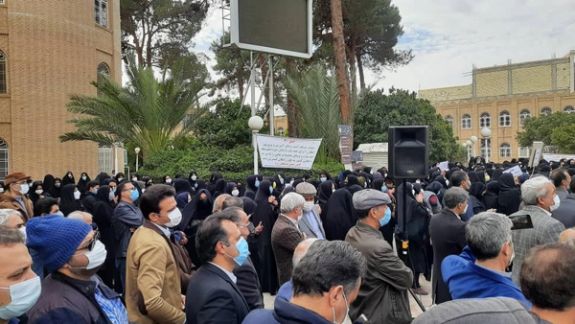
Iran’s education ministry has issued warnings to intimidate teachers and prevent them from participating in protests held regularly to demand higher pay.

Iran’s education ministry has issued warnings to intimidate teachers and prevent them from participating in protests held regularly to demand higher pay.
The spokesman of teachers’ trade associations, which has organized several rounds of nationwide demonstrations, said on Thursday that the new directives are aimed at creating panic among the teachers, so they won’t hold more protests.
Mohammad Habibi revealed some copies of documents in his twitter account, saying that instead of responding to teachers' legitimate demands, education ministry officials have issued directives to school principals asking them to make sure that teachers are warned that attending rallies and sit-ins is against the law and they will face consequences if they take part in protests.
Teachers have planned to hold another round of protests and sit-ins from February 12 to 17 in many cities across the country.
During the latest round of the protests, teachers in 300 cities, town, and villages took part in the protests, and at least seven were arrested.
People from different walks of life, including nurses, firefighters, and even staff members of the judiciary department and prison guards, have held regular protest rallies or strikesto demand higher salaries.
Food prices have risen by more than 60 percent in recent months, on top of high inflation in the previous three years, while the government is unable to sufficiently boost wages as United States’ sanctions impede full capacity oil exports and international trade.

Twelve people were injured at Saudi Arabia's Abha airport by shrapnel from an Iran-backed Houthi explosive-laden drone intercepted by air defenses on Thursday.
In a statement carried by Al Arabiya TV, the Saudi-led coalition fighting in Yemen later warned people in the Houthi-controlled capital Sanaa to avoid civilian locations used for military purposes during the next 72 hours while they strike drone launch sites,
Houthi military spokesperson Yahya Sarea said the group hit a military target at Abha airport with a Qasef 2 drone. Houthis are believed to receive drones and missiles from Iran.
Shrapnel from the drone attack at midday fell inside airport grounds and some glass facades were damaged, it said.
Light injuries were sustained by two Saudi nationals and citizens of Bangladesh, Nepal, India, the Philippines and Sri Lanka.
The coalition has been fighting the Houthis since early 2015, after the group ousted Yemen's internationally recognized government from power in the capital Sanaa.
The Houthis often launch attacks on Abha airport, which lies close to the Yemeni border in Saudi Arabia's south, and other parts of the country with drones and missiles. Most attacks are intercepted but a few people have been killed and several injured.
The coalition regularly carries out air strikes on what it says are Houthi military targets in Yemen. On Thursday it said it would take measures to neutralize the source of threats to civilians in accordance with international humanitarian law.
Reporting by Reuters
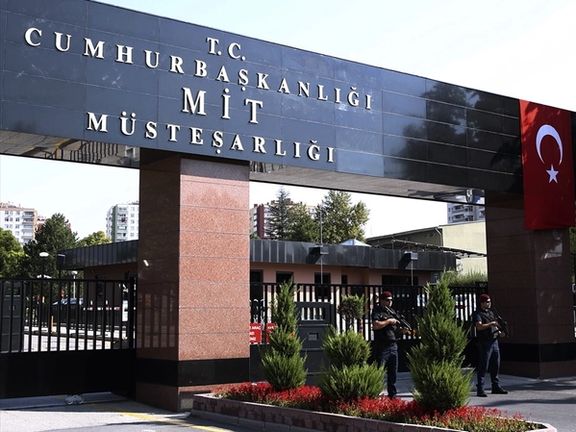
Turkish media reported Wednesday that the country’s intelligence had arrested 17 people allegedly linked to Iranian intelligence who were planning a kidnap.
OdaTV, the online news portal, broke the news with a figure of 11. TR Haber news website later said 17 had been detained in simultaneous operations on January 30. Turkish authorities have not made any official announcement, but have sweeping powers for detention under Turkey’s ‘anti-terrorism’ laws.
OdaTV alleged that the kidnappers included a Turkish state prosecutor, the owner of a defense company, a retired Turkish army colonel, and several non-commissioned officers. It claimed the target of the kidnappers was ‘Shah Nem,’ apparently an alias, who was wanted by Iran’s intelligence and lived in Zonguldak, a city in Turkey’s Black Sea region. The news portal alleged the ‘mastermind’ was Ali Ghahraman-Hajiabad, an Iranian intelligence agent who returned to Iran after organizing the team.
OdaTV also named an Iranian national, Morteza Soltan-Sanjali, as a “key link” in the operation and said he worked for By Saglam, a Turkish defense company, in Tuzla, Bosnia-Herzegovina.According to OdaTV, Soltan-Sanjali travelled to Zonguldak to find the intended victim, realized for some reason the operation had to be cancelled, and was then arrested by intelligence agents when attempting to reach Istanbul.
Soltan-Sanjali had supposedly recruited the kidnappers from retired Turkish and non-commissioned officers. Davut Yilmaz, who worked at the Kartal Anatolian Courthouse, was to use his judicial connections if anything went wrong.
Amid its growing use of extra-judicial powers in the face of criticism from rights groups and the European Union, Turkey has arrested dozens of Iranian and Turkish nationals in the past few years over alleged plots to kidnap or assassinate Iranian dissidents.
In 2021, Turkey released Mohammad Reza Naserzadeh, whom its intelligence agents had arrested in connection with the killing of Masoud Molavi-Vardanjani, a former Iranian defense official, in Istanbul in 2019.Turkey’s Daily Sabah had alleged that Naserzadeh, whom it said was a diplomat working in the consulate’s civic registry, had forged travel documents for Ali Esfanjani, the alleged ‘mastermind’ of the killing.
Iran's foreign ministry spokesman Saeed Khatibzadeh denied reports at the time of Naserzadeh’s arrest early in 2021 that he was an embassy employee, although Turkey's official Anadolou (Anatolia) news agency subsequently published footage of Naserzadeh's arrest at Istanbul airport showing his Iranian service passport.
Turkish government’s official TRT channel reported in 2020 that the its intelligence service MIT had unearthed a network tied to Iran’s intelligence ministry working to abduct or assassinate Iranian dissidents, and that the network had lured Farajollah Chaab, an Arab separatist leader, to Turkey, and then rendered him to Iran, where he is currently on trial.
This week, Turkish media also reported that 16 people including Palestinians and Syrian nationals arrested last October would be put on trial in Istanbul for "political and military" espionage for Israel, while a Danish court this week convicted three members of a Saudi-backed Arab separatist group committed to ‘terrorism’ in Iran.
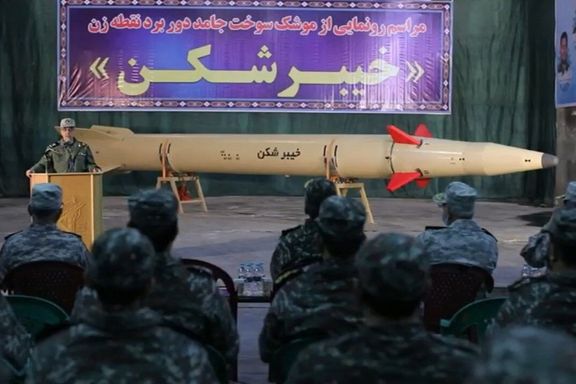
Pentagon says it is working hard to contribute to the self-defense needs of allies and partners to counter threats posed by Iran’s missile program.
Press secretary John F. Kirby said in a briefing on Wednesday that Pentagon is continually watching Iran and is keenly aware of the threats its ballistic missile program poses to the region.
Earlier on Wednesday, at the heels of the new round of nuclear negotiations in Vienna, the Revolutionary Guard (IRGC) unveiled a solid-fuel precision-guided ballistic missile with a range of 1,450 kilometers (900 miles), which puts US bases in the region and Israel within range.
Answering a question if the new missile -- dubbed Khaybar Shekan -- is a message to the US and Israel, Kirby said that the US doesn't look at this as a messaging issue, adding, “We see their malign activities as much more than messaging… they are malign activities on their own. They are destabilizing in the region. They're supporting terrorist groups across the region. They are harassing maritime shipping”.
He described it as “a legitimate national security threat issue in the region to our people, to our facilities, and to those of our allies and partners”, saying that “They are advancing a Ballistic Missile Program that is designed for offensive purposes to inflict harm and damage potentially lethal so on other states, other peoples”.
US lawmakers have asked President Joe Biden to focus on Iran’s missile program.
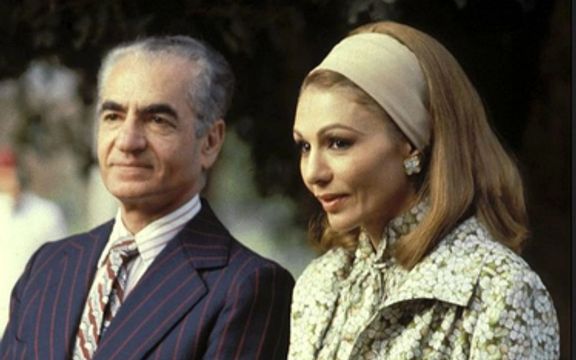
Exiled queen Farah Pahlavi in a message on the anniversary of the 1979 revolution has called the event a “sedition”, expressing hope that Iran can free itself from clerical rule.
Farah Pahlavi, who married Mohammad Reza Shah at the age of 21 in 1959, is 83 years old and lives in Paris. She has come to be seen by many Iranians as a respected elder who campaigned for women’s rights during the secular monarchy.
The exiled queen said in a statement on Wednesday that she is certain “light will defeat darkness,” an implicit reference to pre-Islamic Iranian beliefs in a struggle between good and evil and the eventual triumph of light against darkness.
She expressed hope that all Iranians “who have the love of this ancient fatherland in their hearts” will unite to achieve victory over “gloom and hardships.”
In recent years as economic crisis and heavy-handed policies by the Islamic Republic have worsened, many Iranians have come to praise the Pahlavi dynasty for modernizing the country in the 20th century. On the anniversary of the revolution, many on social media condemn the 1979 revolution as a misguided step.
Islamic Republic’s top officials, increasingly disenchanted by the sharp turn in public mood, have reacted in their speeches and in government-controlled media. Supreme Leader Ali Khamenei this week condemned foreign-based Persian broadcasters for showing conditions in Iran before the revolution.

Hackers have released what they say are judiciary papers asking state spokesmen to say that ad hoc tribunals and a foreign court case broke international law.
The two documents categorized as “highly confidential” were passed last week by hackers Edalat-e Ali (Ali's Justice) to Iran International and other foreign Persian-language media outlets. There was also a document attributed to the Revolutionary Guards (IRGC) according to which discontent in Iran has tripled in a year.
The first document, purportedly a letter from the deputy prosecutor responsible for international cases to Tehran Revolutionary Prosecutor Ali Alghasi Mehr, refers to the London ‘Iran Atrocities Tribunal’ considering the 2019 fuel protests, the Iran Tribunal formed in The Hague in 2007 reviewing 1988 prison executions, and the Stockholm trial of former prison guard Hamid Nouri (Noury) over the 1988 executions.
In his letter, Mostafa Seyed Ashrafi, the deputy prosecutor, said that the foreign ministry, international affairs department in the president's office, government spokesman, judiciary spokesman, and the judiciary's Human Rights Headquarters should actively "explain that these tribunals and trials violate international laws.”
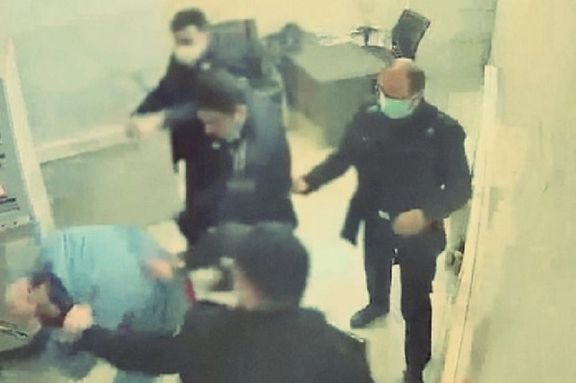
The letter, dated November 15, 2021, also advised unauthorized officials to "avoid making remarks on these events that may bear costs to the country,” citing a claim by deputy parliament speaker Hassan Norouzi, later denied, that he had been “one of those people” who opened fire during the 2019 disturbances.
Whereas the London and The Hague tribunals are non-state bodies whose ‘findings’ are symbolic or political, the Stockholm trial is conducted under Swedish law according to a principle of universal jurisdiction. Noury, who denies the charges, was arrested in 2019 and has been widely reported as guilty.
The second document, dated October 11 2020, is a letter from the International Deputy of the Judiciary Ali Bagheri-Kani, now deputy foreign minister, to then chief justice Ebrahim Raisi, after he visited Greater Tehran Penitentiary and met prisoners sentenced over the 2019 disturbances.
Prison visit
The letter said that people aged 19 to 27, who made up a large proportion of those jailed, had told him they had been coerced into confessing and suggested the cases should be reinvestigated and perhaps included in an amnesty that Supreme Leader Ali Khamenei was reportedly planning.
"All of them wanted to be freed at least conditionally,” the letter said. “Some of the younger ones begged and even cried and asked for help.” Such measures would "hugely blunt the sharp blades of the Western and human rights organizations,” it claimed.
The Edalat-e Ali hackers appeared last August in circulating footage from security cameras in Tehran's Evin prison and more recently hacked into state television's coverage of an Iran-United Arab Emirates football match with a video showing Guy Fox masks from the 2005 US-British film V for Vendetta.
The group, whose provenance remains unknown, claimed they wanted to turn the ten-day celebration of the 1979 Revolution into "the funeral of the Islamic Republic.”
Edalat-e Ali group's name evokes the first of the twelve Shiite Imams, Ali, but may also refer to Supreme Leader Ali Khamenei.